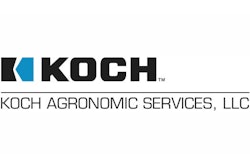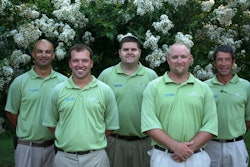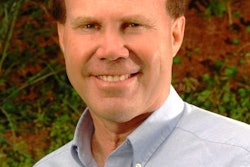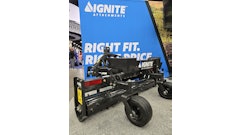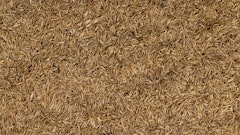There have always been challenges to growing healthy turf, particularly in the areas of soil and water management. But in today’s environment, where society’s concern for the environment and its expectations for lawn care services each continue to grow, lawn care contractors are facing a new set of challenges—challenges that can be overcome by contractors who embrace new technologies and new approaches to lawn care, client communication and education, and professionalism.
This was the message at Agrium Advanced Technologies’ third annual Green Industry Grad School at Farmlinks Golf Club in Sylacauga, AL, November 29 through December 1. The event was attended by roughly 40 leading lawn care and landscape contractors from across the U.S., in addition to Green Industry media and Agrium personnel.
Lawn Care Requires Balanced Approach. Dr. John Cisar of the University of Florida was one of the featured presenters at the Green Industry Grad School. “Today, you must take the concerns of environmentalists, and really the public in general, and come up with solutions that work,” Cisar told contractors. “Every property is different, so you must know the fertility needs of each. The goal is to create healthy turf through a managed, balanced program.”
Cisar also reminded the audience that, despite growing concerns over the environment and the use of products such as phosphorous fertilizers and pesticides, grass and the progression of civilization have always been side by side. “It’s often difficult to achieve all of the things your customers want,” Cisar said, while adding that it is critical to now take advantage of new technologies, such as some of the “enhanced efficiency” products Agrium discussed at the event.
“Enhanced efficiency” products are designed to provide a gentle release of nutrients over time, as opposed to “all at once”, resulting in the need for fewer applications, but also increased nutrient uptake by the plant/grass, less leaching and less lock-off (the point at which the effectiveness of the product plateaus).
Slow-Release Fertilizers represent one technological approach. Agrium’s XCU has a polymer layer inside the protective sulfur layer. The sulfur layer works together with the outer wax layer to protect the polymer coating. When the fertilizer is applied and eventually absorbs water, the outer layers break down, allowing the polymer layer to gently release nutrients over a 10-week period.
Agrium’s BCMU is a slow-release, balanced chain methylene urea. Its unique blend of short, intermediate and long methylene urea chains. Nutrient release is triggered by temperature and microbial activity, which means it works in harmony with plant demand. BCMU ensures that precise levels of nitrogen are delivered over a 12- to 18-week period.
Controlled-Release Fertilizers represent a second technological approach. Agrium’s Duration product is a controlled-release fertilizer that allows nitrogen to be released gradually throughout a plant’s growth cycle. Duration is a polymer-coated urea that features a micro-thin membrane that completely coats the nitrogen fertilizer.
HOW IT WORKS: Water moves into the granule, the nitrogen within the granule dissolves into solution, the nitrogen moves out through the polymer coating as the temperature increases, the fertilizer releases into the soil.
Duration is available in Agrium’s new Spread it & Forget it slow-release fertilizer.
For more on these and other products from Agrium Advanced Technologies, please visit Agrium-Green Industry Pros Product Guide.




